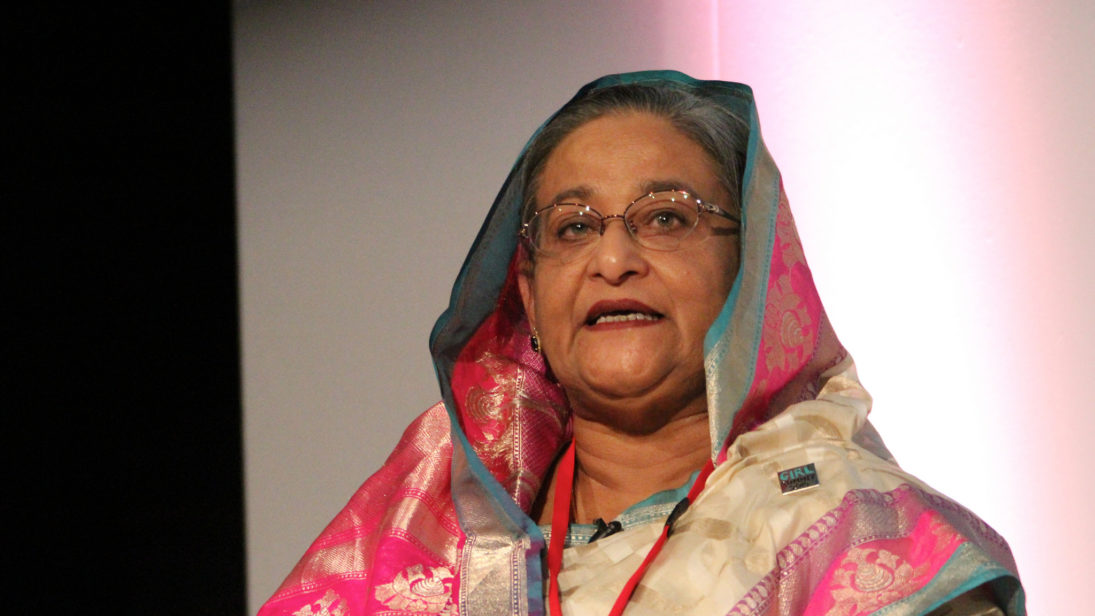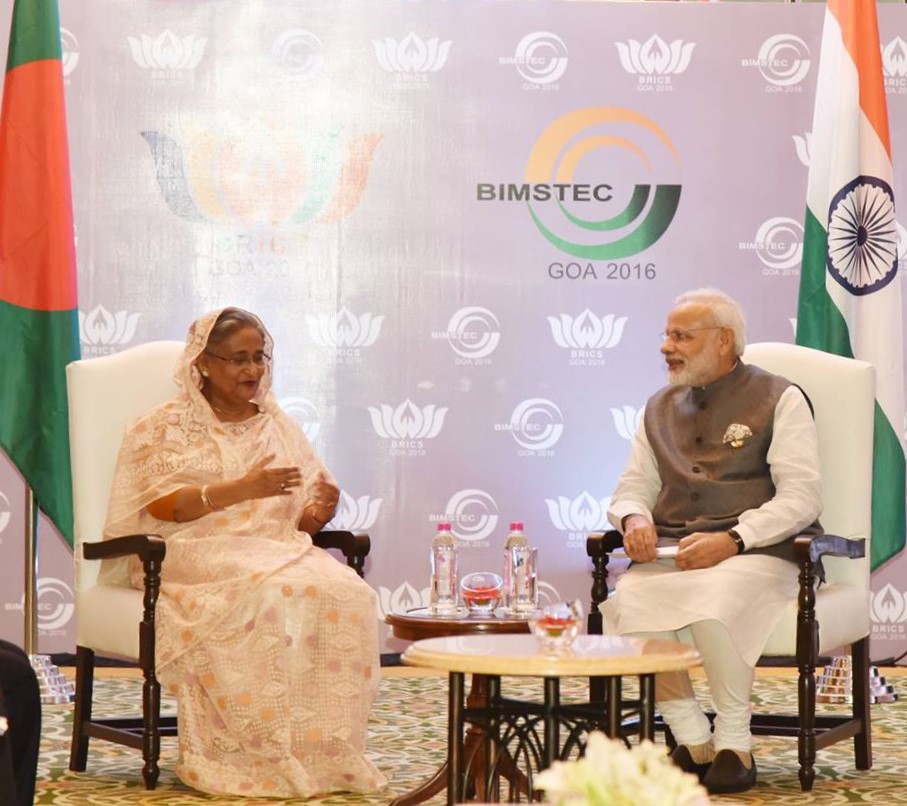
Bangladesh Prime Minister Sheikh Hasina is scheduled to visit India later this week, and the two sides are expected to sign agreements on connectivity, infrastructure, energy, and countering mutual threats. Reports also suggest that the Indian government hopes to sign a long-term defense agreement, but Bangladesh is reluctant to sign anything other than a short-term Memorandum of Understanding (MoU). The Delhi-Dhaka relationship already seems lopsided—the Hasina government has failed to secure anything substantial from the Modi administration. Unresolved issues such as Teesta water sharing, border killings, and the Rampal energy project have led to increasing frustration and discontent in Bangladesh. Speculation in Dhaka is that this upcoming visit too will be more beneficial for India.
Bangladeshi Concerns
The historical perception of India and the current Awami League (AL) government’s dealings with New Delhi play into domestic concerns over this trip. Bangladesh emerged as an independent nation in 1971 after a fierce and bloody battle against Pakistan. India generously supported Bangladesh by sending troops and providing refuge to millions of Bangladeshis. However, after the assassination of Sheikh Mujibur Rahman, the anti-Indian sentiment was fueled by two consecutive military governments. In general, Bangladeshi sentiment toward India continues to be divided, with an appreciation of India’s role in the liberation war but fear of Bangladesh turning into a “satellite country” by the dominance of a big neighbor.
The current Awami League (AL) government of Bangladesh has unequivocally expressed its support of India since it came to power in 2009. The relationship between the two became stronger after India backed Hasina during and after a very controversial 2014 election. The Hasina regime signed the Rampal Energy project agreement with India, risking protest and resentment at home due to the project’s possible detrimental environmental impact on the Sundarbans. Moreover, the government is seen as having bent over backward to address most of India’s connectivity concerns, and given transit rights to Indian goods traveling from India’s northeastern provinces through Bangladeshi territory without adequately considering the benefit for Bangladesh. The Bangladesh Nationalist Party (BNP), one of the two major political parties in the country, has repeatedly accused the AL of selling out Bangladesh to India. Many Bangladeshis resent that India gets the gain, while Bangladesh bears the high cost of infrastructural development. Furthermore, the Bangladeshi government has taken a heavy-handed approach against militants and helped India counter northeastern rebels.
This context is important to understand the reaction in Dhaka to a possible defense deal between India and Bangladesh. Although details remain sketchy, reports doing the rounds claimed that Delhi was keen on signing a “comprehensive, 25-year defense agreement on bilateral defense cooperation” with Dhaka, and had offered a $500 million credit line to purchase military equipment like patrol crafts and radars. However, AL’s closeness with India and how it is currently perceived domestically (due to violations of human rights, curbs on freedom of speech, and rigged and one-sided elections) mean it has been losing credibility among a large section of Bangladeshis, including civil society and environmental activists. Thus, many would see such a long-term defense pact with utmost suspicion.
The China Factor
What makes Bangladesh reluctant to sign such a long-term framework agreement in the area of defense is that India’s interest in pursuing strategic defense relations with Bangladesh is more about its regional competition for influence with China. Bangladesh and China already have such an umbrella agreement on defense cooperation since December 2002, and Bangladesh has been buying military arms and equipment, and recently, two submarines, from China. During Chinese President Xi Jinping’s Dhaka visit in 2016, the two sides elevated bilateral ties from a “closer comprehensive cooperation” to a strategic partnership. In what seemed like a response to Modi’s announcement of a $2 billion credit line to Bangladesh, China signed 27 deals worth about $25 billion. Soon after the Chinese President’s visit, New Delhi presented the idea of a comprehensive defense agreement with Bangladesh.
Over the years, China has proved itself a reliable partner in Bangladesh’s economic development. A long-term defense agreement with India would surely irk China, and Bangladesh wants to be careful to uphold its friendship with both India and China while ensuring its national interest. Also, a defense pact with India may strengthen the public perception that Bangladesh’s defense is becoming too dependent on India.

Teesta: A Thorn in Their Side
The Teesta water sharing deal remains a contested issue between India and Bangladesh, and Dhaka may not see any real progress on this during Hasina’s trip. As an agrarian country, rivers are lifelines for Bangladesh, and a large region of Bangladesh suffers acute water shortage. In 2010, in a joint communique, India and Bangladesh expressed the desire to expedite the resolution of the Teesta issue, and speculation was that the flow would be divided 50-50 between the two countries. However, the deal has not been signed yet due to West Bengal Chief Minister Mamata Banerjee’s strong opposition. During his Dhaka visit in 2015, Indian prime minister Narendra Modi had promised Bangladesh that he would deliver on the Teesta issue, indicating he would bring Mamata around. However, not only was Modi unsuccessful in convincing Mamata but his relationship with her has also deteriorated since then. Thus, patience is running out in Dhaka.
Other Areas of Contention
Hasina’s upcoming visit could facilitate the sharing of more power and energy between the two neighbors. Bangladesh expects to import another 2,000 megawatts (MW) from India, adding to the existing 600 MW. However, the India-funded 1320 MW Rampal thermal power project is already controversial in Bangladesh on environmental grounds, and how these potential new projects are perceived remains to be seen.
Besides water sharing and energy issues, border killings carried out by India’s Border Security Force (BSF) are a major issue in Bangladesh. The BSF has been known to carry out a shoot-to-kill policy, often even on unarmed local villagers, with officials admitting it is a problem. Estimates from human rights organizations suggest that over the past 17 years, Indian security forces are believed to have killed more than 4000 Bangladeshi citizens.
Concluding Thoughts
The Bangladeshi government has already addressed India’s key needs by providing transit, signing energy projects, and helping to fight militancy and northeastern rebels. Now it is time for India to show they want to reciprocate Dhaka’s goodwill. The Modi government seems to have been successful in winning the hearts and minds of the Bangladeshi government. Now it is time to win the hearts and minds of the Bangladeshi people by concluding the Teesta water sharing agreement, signing mutually-benefiting energy projects, and preventing border killings.
Editor’s note: This article is part of our two-part series on expectations from Bangladeshi Prime Minister Sheikh Hasina’s visit to India from April 7-10. Read the entire series here.
***
Image 1: Flickr, Russell Watkins/UK Department for International Development
Image 2: Flickr, Narendra Modi


